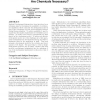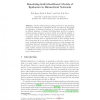973 search results - page 73 / 195 » Arguing Using Opponent Models |
140
Voted
CORR
2006
Springer
15 years 2 months ago
2006
Springer
In this paper we define intensional models for the classical theory of types, thus arriving at an intensional type logic ITL. Intensional models generalize Henkin's general m...
110
click to vote
GECCO
2007
Springer
15 years 8 months ago
2007
Springer
Artificial Development Systems have been introduced as a technique aimed at increasing the scalability of evolutionary algorithms. Most commonly the development model is part of ...
116
click to vote
CAV
2004
Springer
15 years 5 months ago
2004
Springer
Model checking algorithms can report a property as being true for reasons that may be considered vacuous. Current algorithms for detecting vacuity require either checking a quadrat...
112
Voted
ICCS
2009
Springer
15 years 8 months ago
2009
Springer
Current mathematical modeling methods for the spreading of infectious diseases are too simplified and do not scale well. We present the Simulator of Epidemic Evolution in Complex ...
126
click to vote
TMM
2002
15 years 1 months ago
2002
Modeling spatial context (e.g., autocorrelation) is a key challenge in classification problems that arise in geospatial domains. Markov random fields (MRF) is a popular model for i...


